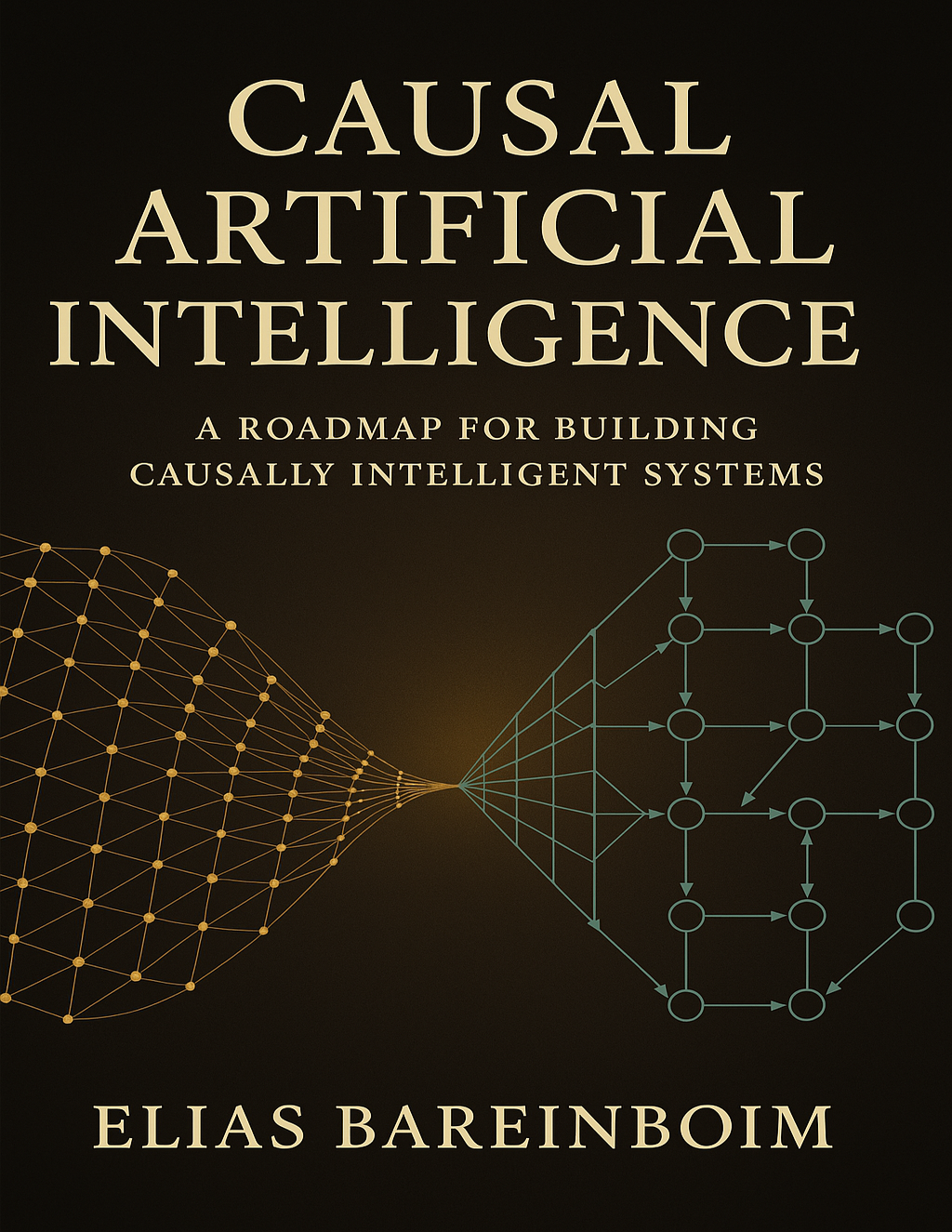Causal Artificial Intelligence
A Roadmap for Building Causally Intelligent Systems
Elias Bareinboim
Draft version (Oct/11/25): link
This textbook offers a comprehensive treatment of the principles, algorithms, and tools necessary for building causally intelligent systems.
It bridges probability theory, causal inference, machine learning, and decision-making under uncertainty, providing a unified roadmap for addressing fundamental challenges in modern AI, including safety, generalization, robustness, and explainability.
Teaching & Slides (coming soon)
Lecture 1 Introduction
Ch. 1-
Logistics; Motivation; Machine Learning.
Pearl's Causal Hierarchy.
Lecture 2 Structural Causal Models
Ch. 2-
Structural Causal Models; Causal Diagrams.
Extra: CHT notes
Lecture 3 Identification of Causal Effects - Basics
Ch. 4, Sec. 4.1, 4.2 (< 4.2.1)Lecture 4 The Problem of Confounding and the Back-door Criterion
Sec. 4.2.1Lecture 5 The Algorithmic Back-door Criterion
Sec. 4.2.2-4.2.3Lecture 6 The Interventional Calculus
Sec. 4.2.5, 4.2.6, 4.3Lecture 7 Causal Operators (L2) and Algorithmic Identification
Sec. 4.4Lecture 8 Counterfactuals Foundations
Ch. 5, Sec. 5.1, 5.2Lecture 9 The Counterfactual Calculus
Sec. 5.3Lecture 10 Causal Operators (L3) and Algorithmic Identification
Sec. 5.4Lecture 11 Partial Identification
Ch. 5, Sec. 5.5Lecture 12 The Sigma Calculus
Ch. 4, Sec. 4.6Lecture 13 Fairness I
Ch. 6, Sec. 6.1-6.3Lecture 14 Fairness II
Sec. 6.4.1Lecture 15 Fairness III
Sec. 6.4.1-6.4.3Lecture 16 Decision-Making I
Ch. 7-8Lecture 17 Decision-Making II
Sec. 9.1, 9.2, 9.5Lecture 18 Decision-Making III
Sec. 9.3, 9.4, 9.6-
Where to intervene.
Counterfactual Decision-Making.
Causal Game Theory.
Lecture 19 Generalizability I
Ch. 10, Sec. 11.1-11.2Lecture 20 Generalizability II
Ch. 11.3, 11.4.Lecture 21 Generalizability III
Ch. 12Lecture 22 Generative I
Ch. 13Lecture 23 Generative II
Ch. 14Lecture 24 Generative III
Ch. 15Lecture 25 Learning I
Ch. 16-
Observational Equivalence Class.
Interventional Equivalence Class.
Lecture 26 Learning II
Ch. 17- Multi-domain Structural Learning.
Lecture 27 Learning III
Ch. 18- Causal Representation Learning.
Lecture 28 Parametric Identification
Ch. 19-
Foundations of Linear SCMs. Causal Regression.
Instrumental Variables. Instrumental Sets. Decompositions.
Monotonic Identification. LATE.
Lecture 29 Causal Estimation
Ch. 20- Double Robutness.
Lecture 30 A Hierarchy of Graphical Models
Ch. 21- Other Inferential Systems.
Structure & Audience
Audience:
Graduate students, researchers, and advanced undergraduates in computer science, statistics, artificial intelligence, and related fields. A basic background in probability, statistics, and machine learning is recommended, though key concepts are introduced from first principles.
Book Structure:
| Part | Key Concepts and Highlights |
|---|---|
| I. Foundations | Causal graphs, Structural Causal Models (SCMs), Pearl’s Causal Hierarchy (PCH) |
| II. Causal Reasoning & Understanding | Interventions, Counterfactual reasoning, Fairness analysis |
| III. Causal Decision-Making | Causal reinforcement learning (CRL), Counterfactual decision-making, Causal game theory |
| IV. Causal Generalizations | Transportability, Domain adaptation, Generalization of counterfactuals |
| V. Causal Generative Modeling | Neural causal models, Structural constraints, Causal generative modeling |
| VI. Causal Learning | Multi-domain structural learning, Causal representation learning |
| VII. Advanced Topics | Parametric identification, Causal estimation, Hierarchies of graphical models |
Usage:
The book supports multiple curricular pathways depending on course goals:
Year-long Curriculum:
- Semester 1: Foundations of Causal AI — Chapters 1–7 provide a complete foundation suitable for a one-semester graduate-level course.
- Semester 2: Causal AI Research Topics — Chapters 8–18 explore advanced areas such as decision-making, fairness, generalization, generative modeling, and causal learning.
Streamlined and Modular Tracks:
- Rapid Foundations Track: Focus on Parts I–II to cover core principles quickly, enabling faster transition to advanced topics.
- Topical Focus Tracks:
• Causal Decision-Making and Reinforcement Learning (Parts III–IV)
• Causal Generalization and Robustness (Part IV)
• Causal Generative Modeling and Representation Learning (Parts V–VI)
Errata
An initial list of errata will be posted here shortly here. Thank you for your patience and interest in improving the material.
About the Author
Elias Bareinboim is an Associate Professor of Computer Science at Columbia University and the founding director of the Causal Artificial Intelligence Lab.
His research focuses on causal and counterfactual inference, and their role in building more general, robust, and explainable AI systems. He is a leading advocate for the causal approach to AI, pioneering solutions to challenges such as decision-making, fairness, and generalization under uncertainty.
Bareinboim serves as the Editor-in-Chief of the Journal of Causal Inference and has received multiple honors, including being named an AAAI Fellow, the NSF CAREER Award, the DARPA Young Faculty Award, the ONR Young Investigator Award, and recognition as one of IEEE's "AI's 10 to Watch." For more information, visit his group homepage.
Contact & FAQ
For questions, feedback, or to report errata related to Causal Artificial Intelligence, please feel free to contact us.
Contact: book@causalai.net
Frequently Asked Questions
Will lecture slides be available for all chapters?
Yes, slides are being progressively posted in the Teaching & Slides section. Please check back for updates.
Will a final version of the textbook be published?
Yes, a finalized edition is planned. Updates will be shared through this website as they become available.
Can I use the slides and materials for teaching?
Yes — you are welcome to use the slides and materials for educational purposes with appropriate attribution.
